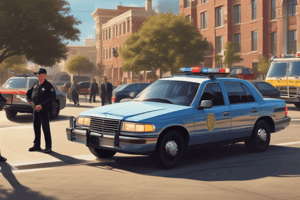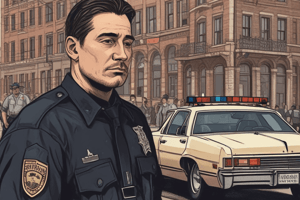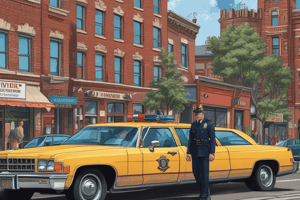Podcast
Questions and Answers
What is the primary goal of policing in terms of crime?
What is the primary goal of policing in terms of crime?
- To provide medical services
- To build public trust
- To promote public order
- To reduce crime rates (correct)
Which role of the police involves maintaining order and resolving disputes informally?
Which role of the police involves maintaining order and resolving disputes informally?
- Service Provider
- Community Safety Officer
- Law Enforcer
- Watchman (correct)
What is the primary aim of policing in terms of community safety?
What is the primary aim of policing in terms of community safety?
- To apprehend offenders
- To provide telecommunication services
- To work collaboratively with residents and community organizations (correct)
- To investigate crimes
What is a key aspect of policing in terms of justice and fairness?
What is a key aspect of policing in terms of justice and fairness?
What is the ultimate goal of policing in terms of public trust?
What is the ultimate goal of policing in terms of public trust?
What is the primary characteristic of a centralized police system?
What is the primary characteristic of a centralized police system?
Which model of policing features multiple agencies operating with a high degree of collaboration?
Which model of policing features multiple agencies operating with a high degree of collaboration?
Which type of police system is characterized by a decentralized command structure with overlapping jurisdictions?
Which type of police system is characterized by a decentralized command structure with overlapping jurisdictions?
What distinguishes a semi-centralized police system?
What distinguishes a semi-centralized police system?
In the context of policing, what does the term 'intelligence-led policing' emphasize?
In the context of policing, what does the term 'intelligence-led policing' emphasize?
What is a key goal of problem-oriented policing?
What is a key goal of problem-oriented policing?
Which model of policing most effectively promotes the cooperation of different agencies to tackle common challenges?
Which model of policing most effectively promotes the cooperation of different agencies to tackle common challenges?
What is a primary role of police in society?
What is a primary role of police in society?
What is the primary focus of intelligence led policing?
What is the primary focus of intelligence led policing?
What approach does problem oriented policing primarily emphasize?
What approach does problem oriented policing primarily emphasize?
What is the key mission of environmental policing?
What is the key mission of environmental policing?
Which of the following is NOT a reason why policing is important in social life?
Which of the following is NOT a reason why policing is important in social life?
Which role of police is primarily aimed at ensuring civilian safety?
Which role of police is primarily aimed at ensuring civilian safety?
How do police officers contribute to crime prevention?
How do police officers contribute to crime prevention?
Which model allows for police officers to develop targeted strategies based on crime analysis?
Which model allows for police officers to develop targeted strategies based on crime analysis?
What crucial element is highlighted in the role of policing regarding social harmony?
What crucial element is highlighted in the role of policing regarding social harmony?
Flashcards are hidden until you start studying
Study Notes
Authority and Roles of Policing
- Police have the authority to intervene in situations with a potential for violence or harm, promoting peaceful resolutions.
- Goals of policing include:
- Crime reduction and creating a safe environment
- Maintaining public order and preventing disorderly conduct
- Upholding justice and fairness through investigation and due process
- Enhancing community safety through collaboration with residents and organizations
- Building public trust and confidence through transparency and ethical conduct
Roles of the Police in the Affairs of the State/Government
- Service provider: providing various services to individuals
- Watchman: keeping peace through informal methods and resolving disputes
- Law enforcer: maintaining order, preventing and detecting crime, and enforcing laws
Intelligence Led Policing
- Focuses on surveillance and gathering information on crime patterns through informants
Problem Oriented Policing
- Emphasizes preventing crime by identifying and analyzing crimes, and developing strategies for effective responses
Environmental Policing
- Refers to government actions to implement environmental requirements and correct activities that endanger the environment or public health
Importance of Policing in Social Life
- Ensures safety and security of individuals, protects their rights, and promotes social harmony
- Key reasons for importance of policing:
- Crime prevention through patrolling, responding to emergencies, and conducting investigations
- Maintenance of public safety through responding to emergencies and enforcing traffic laws
- Enforcement of laws and regulations, investigation, and apprehension of criminals
Types of Police Force
- Centralized Police: a single police force operating in an entire country (e.g. Chile, France, Australia)
- Decentralized Police: independent police administrations and operations in different states (e.g. India, Pakistan)
- Semi-Centralized Police System: shared responsibility for law and order between federal and state governments (e.g. Brazil, Japan)
- Sub-types of Centralized Police:
- Multi-Coordinated Police Force: multiple agencies with overlapping jurisdictions and a less coordinated approach
- Coordinated Police Force: multiple agencies working together with a high degree of collaboration and cooperation
- Single Police Force: a unified entity responsible for law enforcement across an entire country
Studying That Suits You
Use AI to generate personalized quizzes and flashcards to suit your learning preferences.




